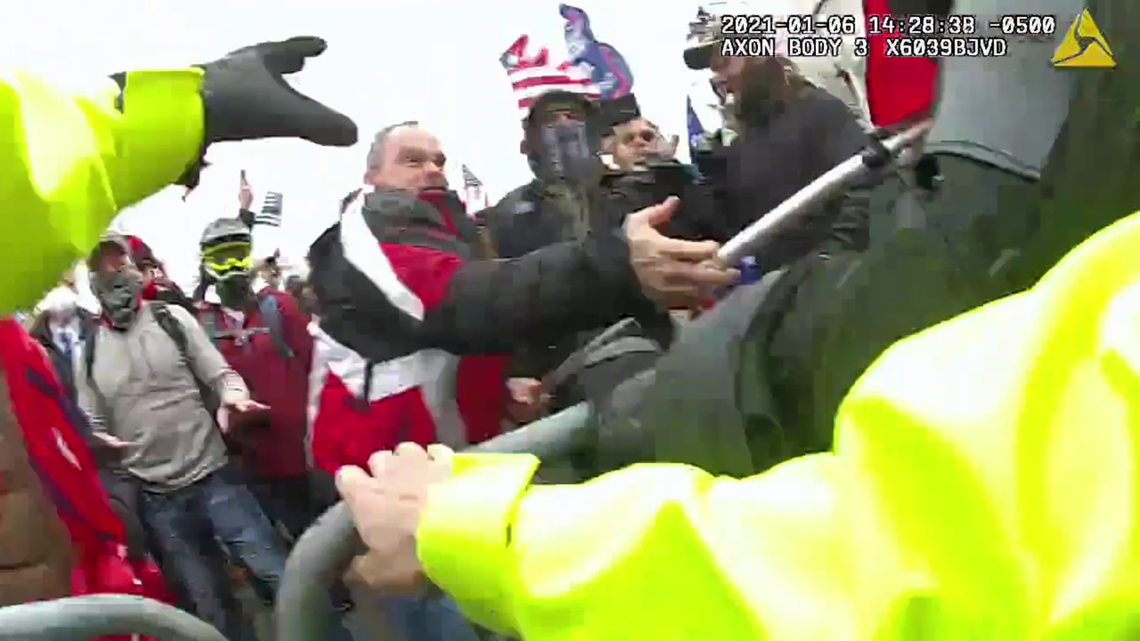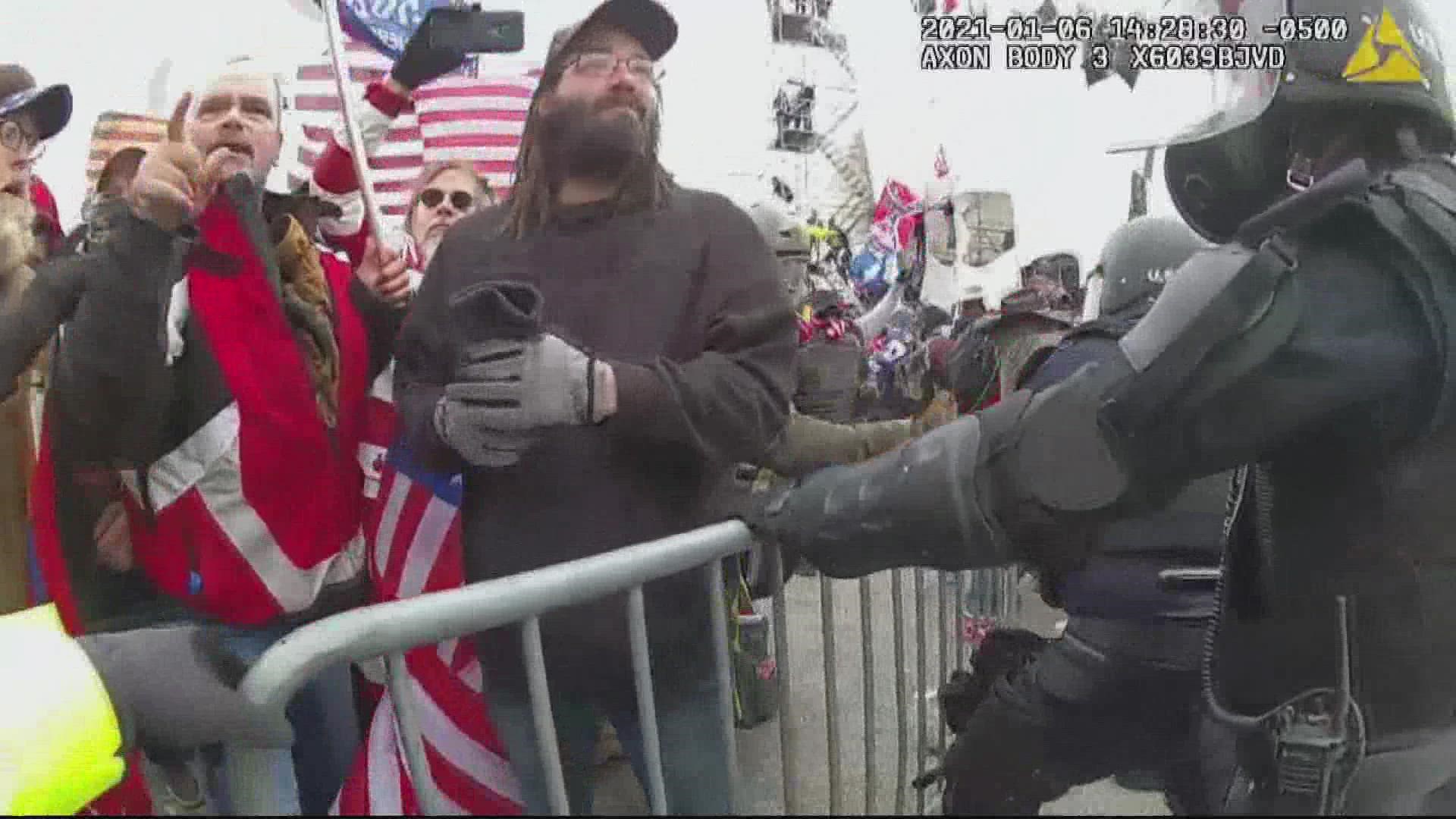WASHINGTON — A federal judge sentenced a former NYPD officer and U.S. Marine Corps veteran to 10 years in prison Thursday – handing down the longest sentence to date in a Capitol riot case.
Thomas Webster, 56, of New York, showed no reaction as U.S. District Judge Amit P. Mehta ordered him to serve 120 months in prison for assaulting a D.C. Police officer and directly contributing to breaking a tenuously held police line on the west side of the U.S. Capitol Building on Jan. 6.
“If you look at the before and after of that video,” Mehta said, “it was an intact police line. It’s not until you arrived that all hell broke loose.”
The sentence puts Webster, who served for 20 years as a New York City police officer, at the top of a growing list of felony defendants in Jan. 6 cases ordered to serve substantial time behind bars. Both Texas Three Percenter Guy Reffitt and former Rocky Mount, Virginia, police officer Thomas Robertson were ordered to serve 87 months behind bars — previously the longest sentence a Jan. 6 case — and two other men accused of assaulting police, Mark Ponder and Robert Palmer, were both sentenced to 63 months in prison.
Prosecutors asked Mehta to sentence Webster to more than 17 years behind bars, saying he'd shown no remorse or contrition for using a Marine Corps flag and then his bare hands to repeatedly attack DC Police Officer Noah Rathbun. Prosecutors also said Webster had lied on the stand when he claimed at trial Rathbun — who he referred to as a "rogue cop" — had instigated the assault.
Mehta stopped short of ruling outright that Webster lied, saying he'd already received an obstruction enhancement for deleting photos from his phone, but noted that the sentencing memo Webster's attorney, James Monroe, submitted "could not be more at odds with his testimony."
"There's no doubt what you got up and said that day was utterly fanciful and incredible," Mehta said.
Mehta also wrestled with the potential sentencing disparity between the prison term prosecutors wanted for Webster and the 63-month sentences received by Ponder and Palmer, who both assaulted police repeatedly with weapons (both Ponder and Palmer accepted plea deals, resulting in a reduced sentencing range). The DOJ compounded the issue by requesting an unusual body armor enhancement for Webster, who wore his NYPD-issued bulletproof vest to the riot. Mehta eventually granted the enhancement, but suggested he intended to mitigate its "draconian" effect of adding more than six years to Webster's sentencing guideline. Because Webster was already facing a guideline range running to the edge of the maximum allowed by the most serious charge in his case anyway, Mehta said the enhancement ultimately had little effect on his decision.
Webster was convicted by a jury in May of six counts, five of them felonies. During trial, prosecutors showed video of Webster “elbowing” his way through the massed crowd on Jan. 6 to where DC and U.S. Capitol Police officers were holding a perimeter behind a line of bike racks. Body cam video showed him immediately screaming at one of those officers, Rathbun, before initiating what prosecutors described as a “rage-filled” assault within seconds of arriving at the police line. Video showed Webster repeatedly swinging a metal pole at Rathbun and another officer before charging through the barricade and tackling Rathbun to the ground, where he attempted to rip off his gas mask and helmet. Rathbun testified that Webster’s attack choked him and left him gasping for air as he felt other rioters kicking him while on the ground.
After the assault, Webster made his way to the Lower West Terrace, where he urged viewers of another rioter's livestream to, "Send more patriots!"


In his sentencing memo, Webster's attorney Monroe asked for a significant downward variance, amounting to the 127 days Webster had served in jail and more than a year on home confinement, citing his service as a Marine and a NYPD officer of 20 years. Despite Webster's testimony during trial — when he repeatedly blamed Rathbun for instigating the assault and made claims that were unsupported, and on several occasions directly contradicted, by video evidence — Monroe described his client Thursday as a "good, decent man" who had been mislead by former President Donald Trump's desire to cling to power.
Monroe said the assault was a blemish on Webster's otherwise sterling life and described it as "46 seconds of delusion that he could have some say over who was going to be the next president of the United States."
Webster himself took the stand briefly, saying he respected the jury's decision and wished he had never come to Washington, D.C., on Jan. 6. He also apologized to Rathbun, who was present in the courtroom.
"I want to apologize to you and your family," Webster said. "I know how that impacts your family. I'm sorry."
Before delivering his sentence, Mehta said he agreed with Webster on one point.
"I do wish you hadn't come to Washington, D.C.," he said. "I do wish you had stayed home in New York and not come out to the Capitol that day. Because all of us would be far better off."
Webster's 10-year sentence, would have been longer, the judge said, had he not received credit for his more than two decades of service as a Marine and police officer. But Mehta, who has described defendants in other cases as "pawns" of those who spread lies about the 2020 election, said Webster also presented a serious need to deter others who might, like him, resort to political violence.
"We simply cannot have a country where people on the losing side of an election think they can use violence and physical force to undo that," Mehta said.
Mehta also again admonished Webster for his testimony on the stand, saying it was clear he hadn't been truthful.
"The jury saw through it. I saw through it. It wasn't that hard," Mehta said. "I'm sorry you thought you could get up there and say otherwise."
We're tracking all of the arrests, charges and investigations into the January 6 assault on the Capitol. Sign up for our Capitol Breach Newsletter here so that you never miss an update.

